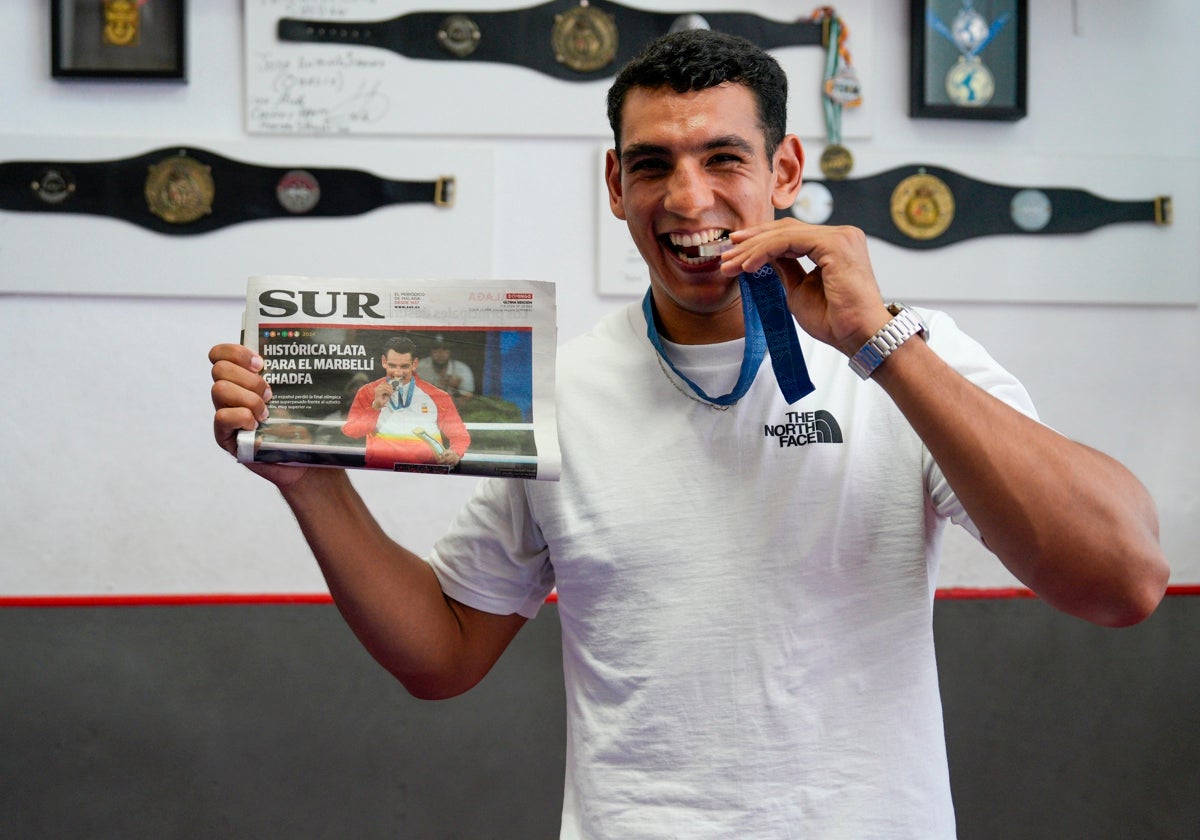Costa del Sol boxer Ayoub Ghadfa: 'We must inspire children to fight for their dreams'
After a crazy month, the Olympic silver medallist sat down with SUR on his return to Gym Sho-Dan in Marbella where his career began
Marina Rivas
Marbella
Monday, 19 August 2024, 13:41
People like boxer Ayoub Ghadfa deserve to be heard and followed. He is a young fighter, dedicated to sport, lives a good life, and is committed to conveying the importance of education and sporting values to future generations.
These principles propelled him towards his historic Olympic super heavyweight silver medal in Paris a little over a week ago. This achievement has not gone unnoticed in his hometown of Marbella, where he was greeted by a surprise crowd during his visit to the Sho-Dan gym, where his career began.
Around a hundred adults and children asked the boxer for photos and autographs, creating a moment to remember and making him realise the significance of his medal.
Now, all that remains is to see what the future holds—whether he will continue as an amateur or turn professional.
- Did you expect such a reception?
- No, I honestly didn’t. It surprised me. Seeing all the youngsters, all the kids, it was really cool.
- Have the last few hours since the Games been as hectic as this?
- More or less. There were lots of people at Madrid Airport as well. [Fellow boxer] Emmanuel [Reyes Pla] and I spent nearly an hour taking photos. It was really cool.
- Does it feel strange that suddenly everyone knows who you are?
- Well, gradually I’m getting used to it. I’m starting to realise that I’ve achieved something big.
- Before the Games, I remember you saying this was just like any other competition, but now you're realising the impact of standing on an Olympic podium, aren’t you?
- That’s true, but on the other hand, when you’re competing, you can’t think about it being the Olympics or a World Championship, because that puts pressure on you. You have to think of it as just another competition. The opponents are the same as always; the venue might be bigger or smaller, but in the end, the ring is the same as ever. Now, it’s true, I can say, “Yes! I did it!”
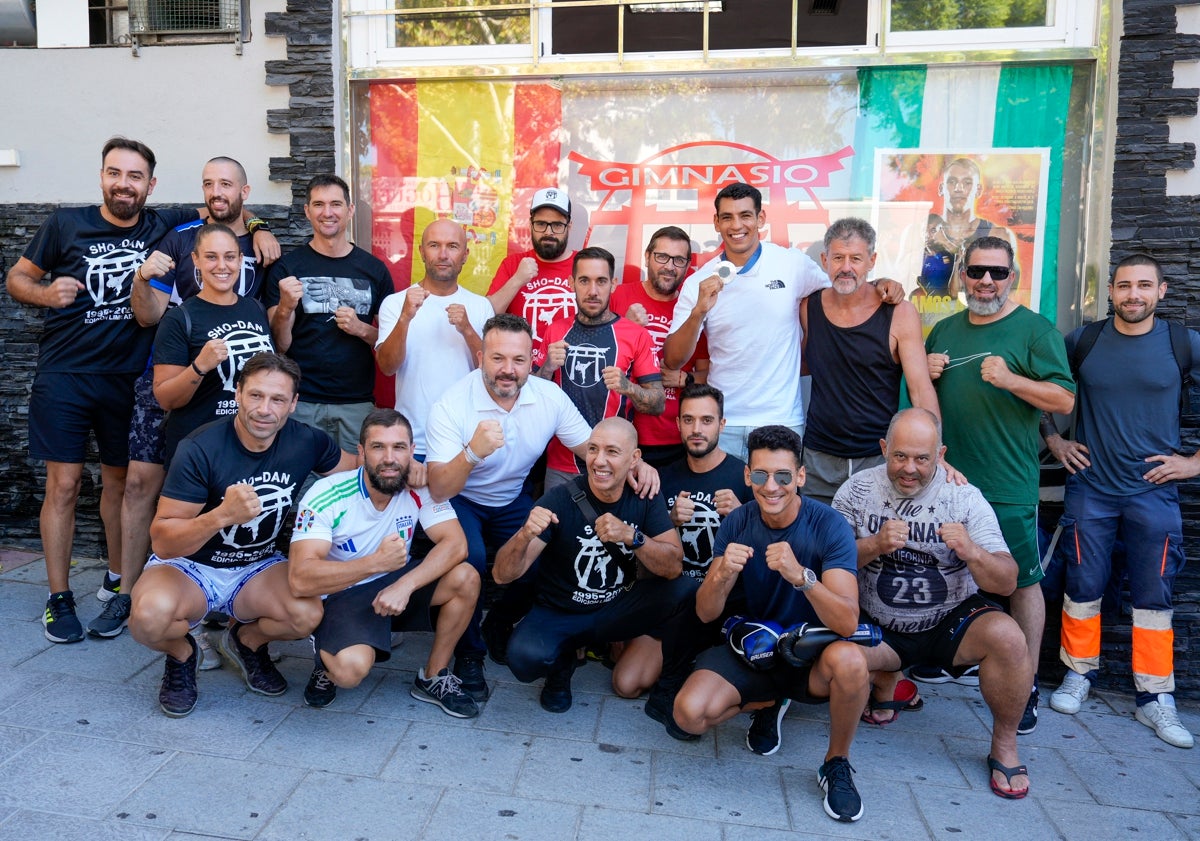
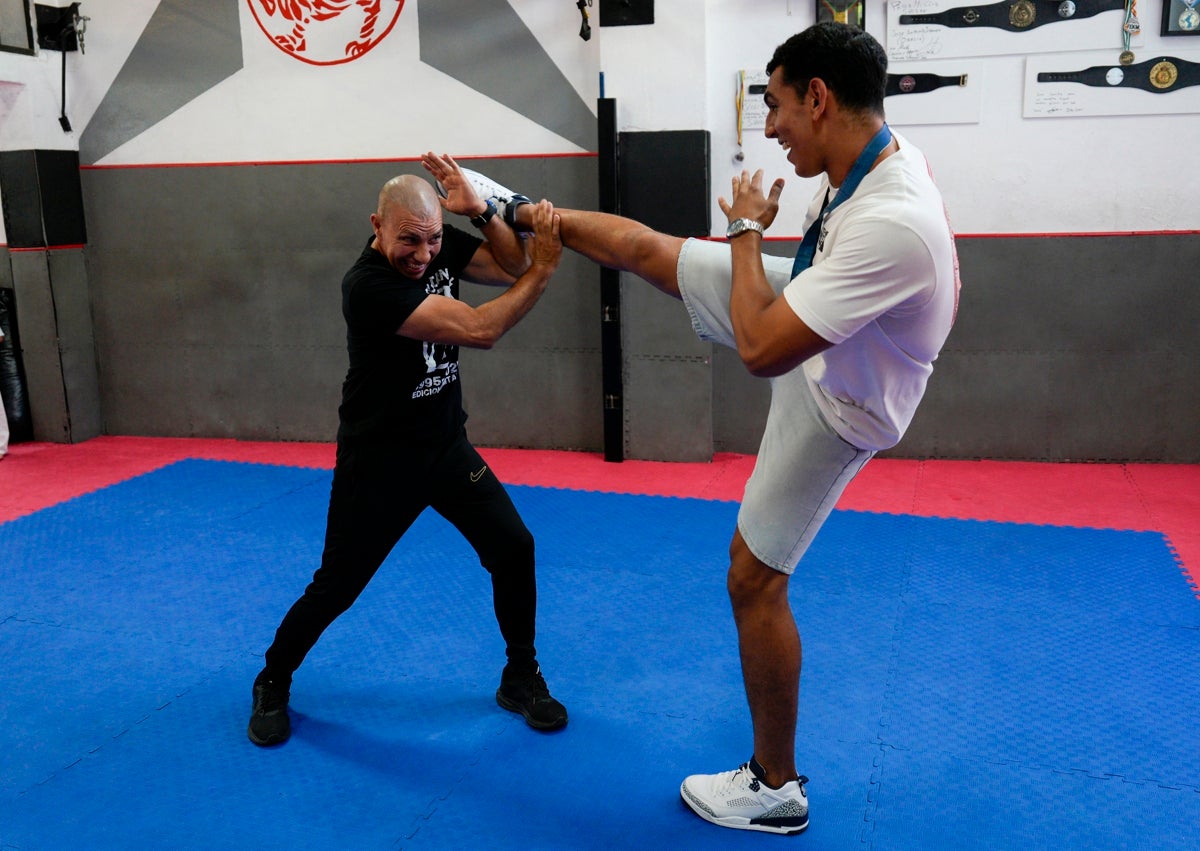
-U23682171374TRk-711x841@Diario%20Sur.jpg)
- There was an epic moment at the Games, in the semi-final against the French opponent, when the Philippe Chatrier court at Roland Garros was against you, booing. How did you experience that fight?
- Honestly, that’s something that has never affected me. I’ve fought in opponents’ backyards before, like in the 2022 European Championships. In the 2024 European Championships, I also fought the final against a Serbian, with the stadium full of Serbians, and it didn’t affect me. When I’m in there, it’s just me and my opponent in the ring, and there’s no one to help you.
- Which fight in Paris had the biggest impact on you?
- The first one, which was quite tough, to be honest. It also broke the ice. I was more tense and ended up exhausted. He was a difficult opponent, but thank God we got through it.
- Regarding the final, did you approach it as a reward for your tournament, or were you genuinely determined to win the gold?
- Just being there was a reward in itself; reaching the Olympics was a prize for me, as my short-term goal was to qualify. Winning the first fight was another reward. It’s a series of rewards, but yes, I wanted to win the final. I had my strategy in place, I even visualised myself winning against my opponent, but it wasn’t to be. In the end, I gave it my all, performed well, and that’s that. I have no regrets. I gave everything, which is what matters, and I’m happy with my performance.
- On this occasion, at least, the gold was well-deserved for Bakhodir Jalolov, who was more experienced and in great form. But do you think it was unfair that he had already competed as a professional, given that Olympic boxing is amateur?
- No, I think it’s fair. The best go to the Olympics, whether they’re professionals or amateurs. I don’t mind. It’s the best against the best. If a professional wants to return to being an amateur to compete in the Olympics, I wouldn’t have a problem with it because, in the end, it’s the best. In fact, they have more to lose than to gain, which is why professionals often don’t return to amateur status, mainly due to financial reasons. Their market value decreases.
- One of the positive images after the fights was the sportsmanship displayed, even among rivals. For example, you hugged Jalolov at the end of the match…
- Yes, exactly. We already knew each other. I spent time with him during the training camp we did in France. I talked to him, and he’s a good guy. Although he has a stern look, he’s actually a decent person [laughs]. In the end, there’s always respect in boxing. You finish the fight, and while the other person may not be your friend, there’s camaraderie and good vibes.
- We did a bit of research on Jalolov, and he’s a real star in his country, like Cristiano Ronaldo in Portugal. It would be nice if athletes were valued like that in Spain, don’t you think?
- Yes, as you said, he’s like Cristiano Ronaldo over there. When we went to Uzbekistan, we saw him everywhere—on buses, giant billboards, advertising all sorts of things. In Spain, football and basketball take precedence, which is fine because it’s what people like and consume. People pay, which is why they earn so much and have so many sponsors, and that’s understandable too.
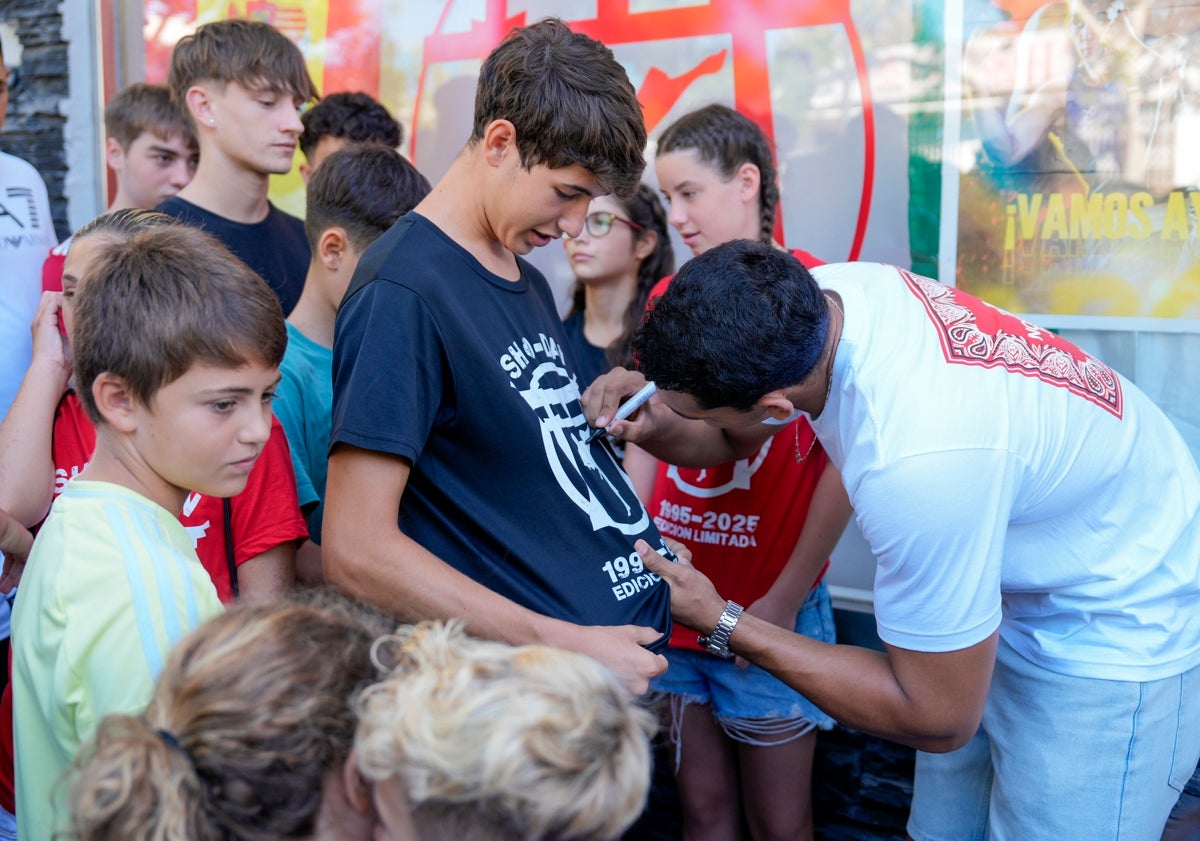
-U38626453564OWq-1200x851@Diario%20Sur.jpg)
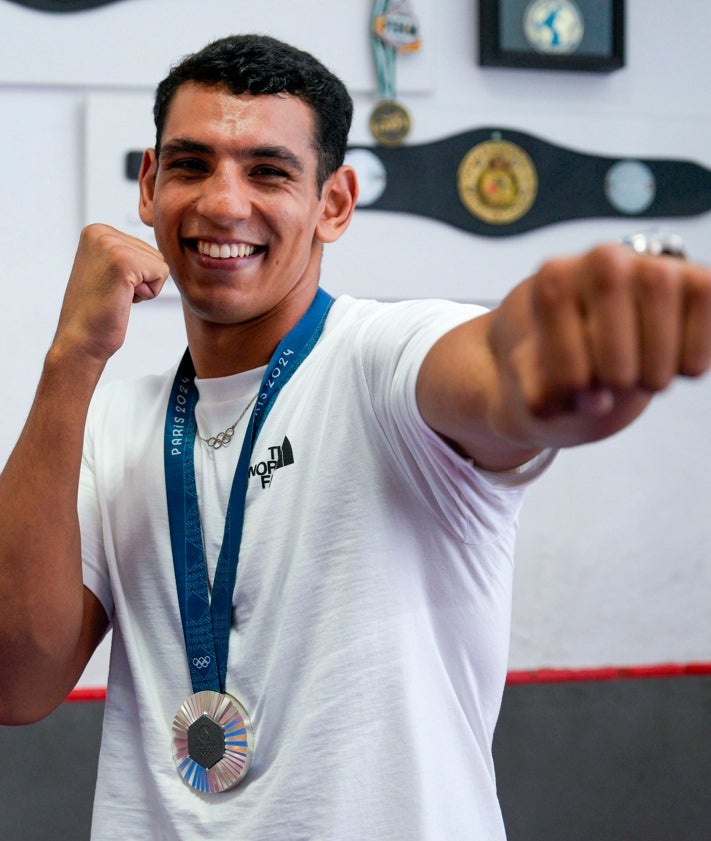
- While that’s true, being an Olympic medallist has put you in the spotlight, and you can now take advantage of that to ‘sell’ your brand and make it even more successful…
- Yes, exactly. Now is the time to capitalise on the momentum and try to grow as a public figure, as an athlete, and in every way. In the end, you have to seize the opportunity.
- Let’s go back to the Games. What memorable moments did you experience? What stands out for you, or what surprised you the most?
- The opening ceremony was incredible, but the problem was that we got soaked [laughs]. We were drenched and couldn’t finish it. We went back home to avoid getting ill, but it was really cool. And in the Olympic Village, we met the King, who sat down to eat with us. We also met so many athletes… I ran into [tennis players Rafael] Nadal and [Carlos] Alcaraz. I was on my bike, and we greeted each other. I was too shy to ask for a photo, but I would have liked to [laughs].
- Who did you share a room with?
- Emmanuel [Reyes Pla], who also won a bronze medal. He’s a great guy, we had a lot of fun together.
- We talked about the moment on the podium in a previous interview because one of your earliest Olympic memories was seeing the Spaniards on the podium at Rio 2016. That really stayed with you, and now you’ve experienced it yourself. What did you feel at that moment?
- At the time, I was full of emotion and adrenaline… I felt an immense pride standing up there on the podium, and then I saw my parents down below.
- Did you expect them to be there for the final, or was it a surprise?
- No, it was a surprise. I only saw them after the fight. They told me to 'look over at the stands', and there they were—my mum and dad. I had a hunch because when I spoke to them on the phone, they were talking really fast, which I found a bit odd. I thought, how strange. It was incredible to have them there.
- What’s your standout moment from the Games?
- That moment, celebrating my medal with them.
- The big question now is what you plan to do next. Will you stay in the amateur world for a few more years, or will you try to go professional?
- Right now, I’m not sure. For the time being, I’ll stay amateur. I’m seeing what offers come in and what else I can do. If boxing remains an Olympic sport for the Los Angeles Games, I plan to stay on for the next cycle.
- Do you think making the transition to professional boxing will be tough? Is there a big difference between high-level amateur and professional boxing at the moment?
- Yes, but amateur boxing is challenging in its own way. In the professional ranks, the difficulty is that it takes years of rankings and fights to reach a world level. But amateur boxing is very tough too. A lot of people think amateur boxing is for beginners, but the tournaments are gruelling, requiring lots of preparation and many fights over consecutive days, not just one... It’s different.
- So, for now, you’re putting aside your other dream of becoming a PE teacher to focus on your boxing career, right?
- Yes, but I’ll keep studying and learning as much as I can. I’m going to do a Master’s in teaching at UCAM. It’s important to keep progressing, as you never know when your sporting career might end.
- That’s the main message you’ve shared with the kids today, isn’t it? Just a moment ago, you gathered them around and spoke about the importance of education...
- Exactly, I want to encourage them to study and listen to their parents. Many kids think they know it all and end up going down the wrong path, which is a shame because there are kids with talent and great qualities who waste them. Besides education, sport teaches you values, and that’s what we need to pass on: study, do sport, and listen to your parents. You need to do something worthwhile with your life and not waste time on things that don’t matter. Sport gives you discipline, values and, if you go far, you can make a living doing what you love.
- Regarding the bullying you experienced as a child, it’s part of your story, but you’ve hinted that you don’t want it to overshadow your sporting career. Is that correct?
- Exactly. It was a time that taught me to fight, to follow my dreams, and not to give up. I could easily have fallen into depression or locked myself away playing video games, never going out to avoid being bullied, but I chose sport. You go out, train, go to the gym, meet people... And that really helps. Talking to your parents, and even your teachers, helps too. We need to motivate kids to fight for their dreams.
- So you don’t want your personal story to be focused solely on that period...
- Exactly, and not on the fact that I’m the son of immigrant parents. I don’t think it matters whether my parents are Moroccan, Chinese or Congolese. What matters is that they raised me well, that I’ve got an education… There’s more to it than that. I know it can be an inspiring message, but it doesn’t always need to be the focus.
- What do you dream of for the future?
- I could say being an Olympic champion in Los Angeles, but of course, if that doesn’t happen or even if boxing gets dropped... My real dream is to be happy. If you’re happy, you’ve already succeeded.
